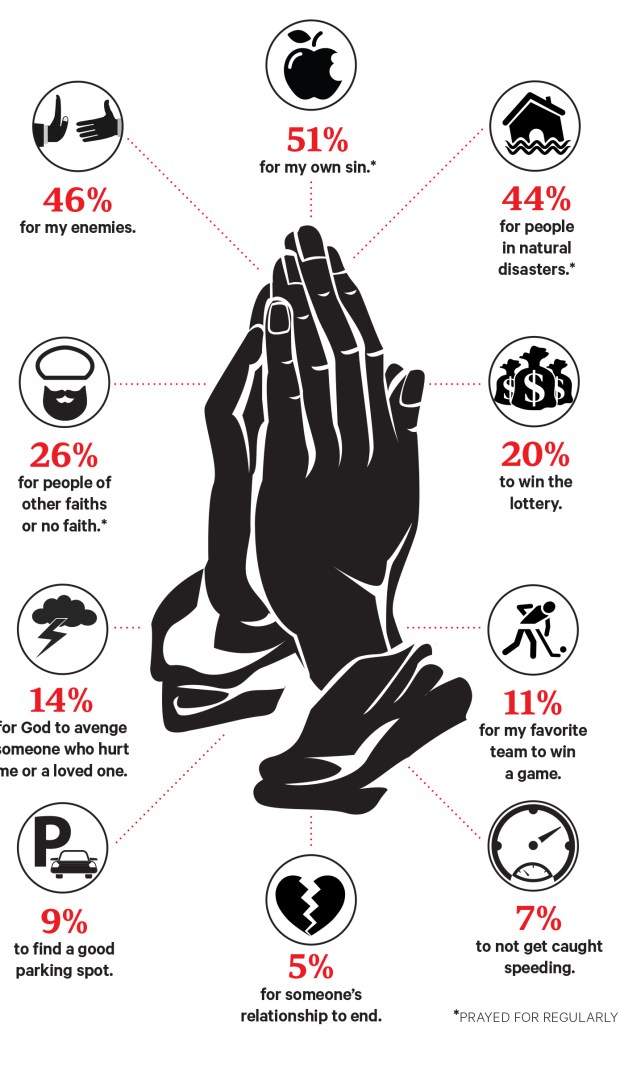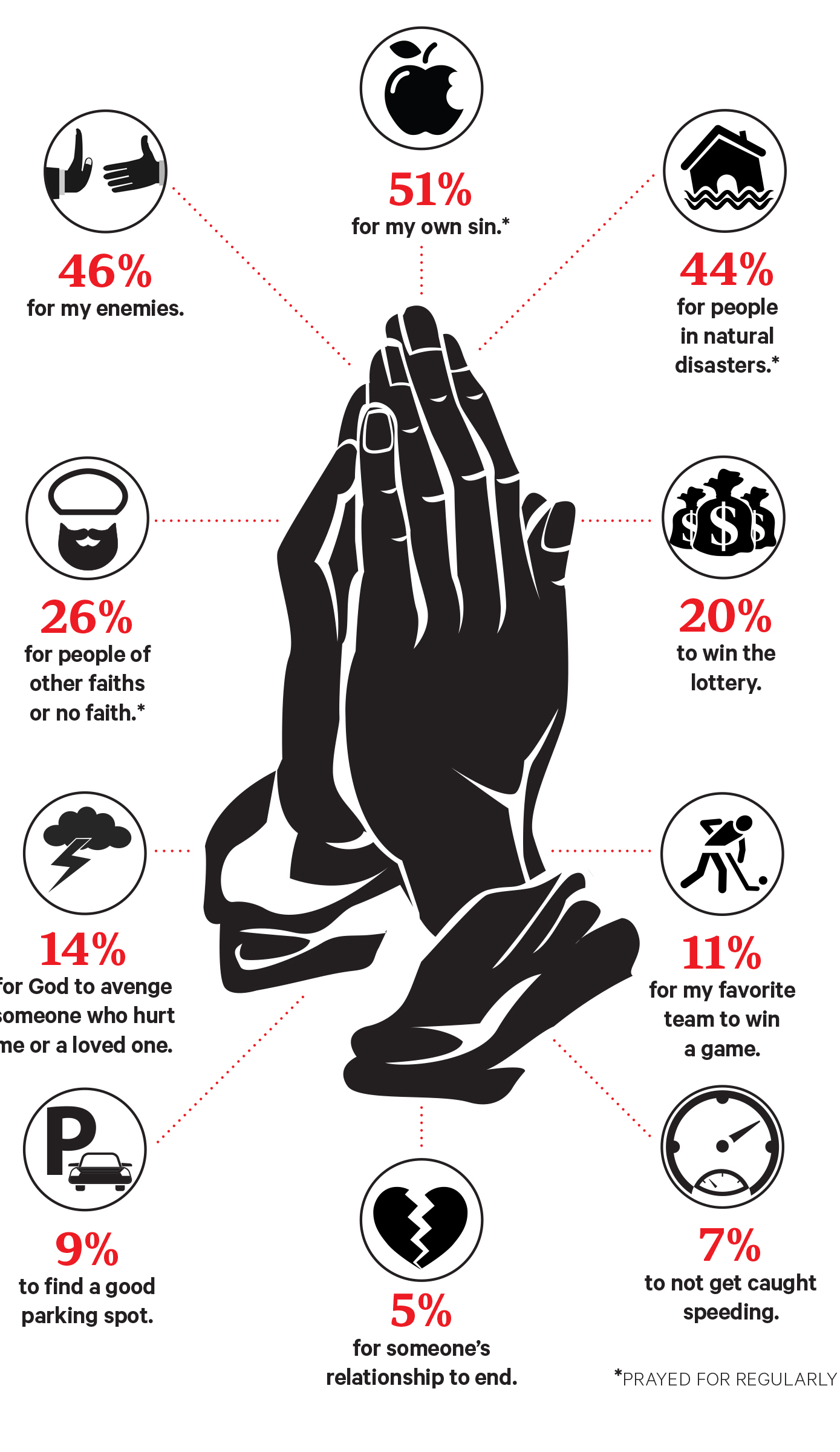Prayers of the People
Protestants who told author Max Lucado and LifeWay Research that they have prayed:

Hong Kong Christians drive democracy debate
Crosses and other Christian symbols were highly visible during the protests that shut down the streets of Hong Kong this fall. Several of the pro-democracy movement’s top groups were led by Christians. Many churches announced neutrality but fed and housed the protesters, who objected to Beijing controlling ballots for the island city’s first free election in 2017. Some worried the protests could hinder Hong Kong pastors’ evangelism on the mainland, which Beijing has permitted through a partnership with its official Three-Self Church.
President resigns from Christian college
Patrick Henry College parted ways with its second president, Graham Walker, in what he called "a healthy and amicable way as fellow servants of Christ." Walker had secured accreditation for the 14-year-old Virginia school, but he and trustees had "fundamental disagreements" over the best way to grow the 300-student body, according to Daniel Noa, president of the alumni association. Walker was hired in 2006 to bring stability after theological differences between college founder Michael Farris and 5 (of 16) full-time faculty led to their resignations.
(UPDATED) Wesleyans almost lose a publisher
Did the main "contender against the Calvinist hegemony of Christian publishing" nearly shut down? Such was the concern of Ken Schenck, dean of Indiana Wesleyan University’s Wesleyan Seminary, after the October announcement that Nazarene Publishing House (NPH) would cease operations on December 1. The denomination's board cited "shifting cultural circumstances" and decreasing profits for NPH's "financial crisis," but maintained that the 102-year-old publisher's troubles began in earnest after the "miscalculation" of selecting businessman Gerald Smith as CEO in 2012. (Smith was fired in September.) "We apologize for what has appeared as poor decisions, a failure to act sooner, or even the appearance of wrongdoing," said the Church of the Nazarene's superintendents. However, a "major restructuring" launched December 2 allows NPH to continue on with a new staff, meaning Holiness churches can still enjoy NPH's Beacon Hill Press books, Lillenas worship resources, and Word Action Sunday school curricula. Meanwhile, Ben Witherington at Asbury Theological Seminary argued that Arminian thought would have still circulate just fine via the United Methodist Church’s Abingdon Press.
Egypt: Facing ISIS, Mideast Christians exchange strategies
Middle Eastern evangelical leaders met in Cairo in October to discuss damage control after isis displaced many of their communities. Some urged their fellow Christians to take up arms. Others met with Sunni Islam’s top leader, the grand sheikh of al-Azhar, who condemned ISIS’ actions and asserted Christians deserve a place in the region. Moderate Muslims can likely do more to end the influence of isis than Western or Christian efforts, said Mogens Kjaer of Danmission, a Danish nonprofit that sponsors many evangelical initiatives in the region. Meanwhile, members of the largest Protestant church in the Middle East, Cairo’s Kasr el-Dobara, have been delivering relief supplies donated by Egyptian Christians to refugees in Kurdistan every two weeks.
South Korea: ECFA launches Korea affiliate
Seoul Christians collaborated with the Evangelical Council for Financial Accountability (ECFA) to launch the first similar entity outside of North America. While the Washington, D.C.–based ECFA can legally accredit only American nonprofits, president Dan Busby said it will share resources and knowledge with the new Christian Council for Financial Transparency in Korea, and hopes an April summit will encourage other countries to launch similar efforts. David Yonggi Cho, founding pastor of the world’s largest church, was found guilty in February of embezzling $12 million from Yoido Full Gospel Church. That same month, the World Evangelical Alliance postponed its General Assembly scheduled in Seoul, citing "internal divisions" among the peninsula’s evangelicals. A survey by the Christian Ethic Movement revealed that only 1 in 5 South Koreans find Protestant churches to be trustworthy.
Global Christian groups combat sheep stealing
Many of the world’s largest Christian umbrella groups have begun drafting a new statement on “sheep stealing” (the practice of one denomination taking members from another). Representatives from the World Evangelical Alliance (WEA), the Pentecostal World Fellowship, the Vatican, and the World Council of Churches (WCC) will recommend how congregations can work together in the same communities, and will encourage reconciliation between churches that have experienced "tension and pain" over "conflicting" evangelism methods. The WEA, WCC, and the Vatican issued similar guidelines on evangelism in 2011. The new recommendations, collected by the Global Christian Forum, are due in three years.
Fired president settles lawsuit with CCCU
The Council for Christian Colleges and Universities (CCCU) and Edward O. Blews Jr. settled Blews’s lawsuit one year after the former president was fired after 10 months on the job. Details remained private, but Blews and the CCCU said they "parted ways because of philosophical differences over leadership approach vis-à-vis the culture of the council and because of fundamental differences in management style and priorities." In July, Calvin College dean Shirley Hoogstra was named the CCCU’s first female president.
Churches serve immigrants at next legal level
A coalition of 15 evangelical groups—including the National Association of Evangelicals, World Relief, and the Assemblies of God—is partnering with churches nationwide to help them get accredited as legal advocates by the federal government’s Board of Immigration Appeals. Church clinics that are partially accredited can represent immigrants before the Department of Homeland Security. Those fully accredited may also go before immigration courts. Churches don’t need in-house attorneys to qualify, but do have to offer a legal resource library and a legal technical support provider. “Churches are a trusted presence in immigrant communities that can—and should—help address this critical shortage of legal services,” said Noel Castellanos, CEO of the Christian Community Development Association and chairman of the Immigration Alliance. The coalition wants to increase church-based legal clinics from 29 to 1,000 by 2017
49% Unchurched Americans who cannot identify a single way Christianity has positively impacted the United States.
37% Unchurched Americans who cannot identify a single way Christianity has negatively impacted the United States.
46% Practicing Protestant millennials who believe "the Bible can only be correctly interpreted by people who have years of intense training in theology."
[Editor's note: Nazarene Publishing House was still facing closure when CT's December issue went to press. The above item has been updated to reflect its recent restructuring.]










